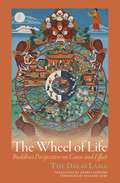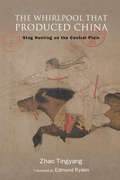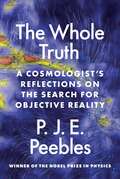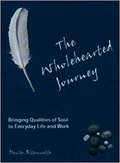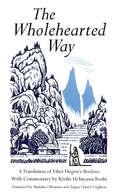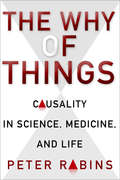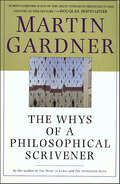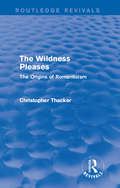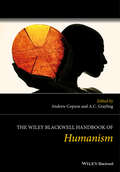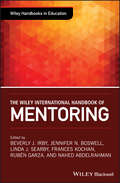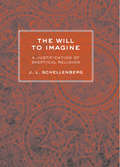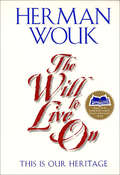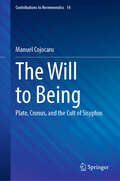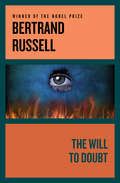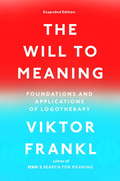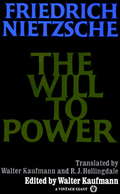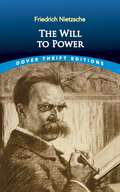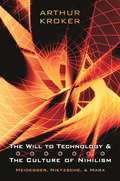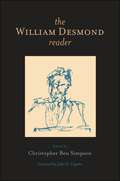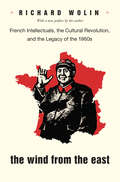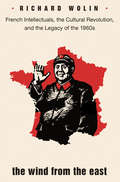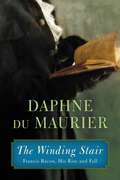- Table View
- List View
The Wheel of Life: Buddhist Perspectives on Cause and Effect
by Dalai Lama Jeffrey Hopkins Richard GereUsing the traditional Buddhist allegorical image of the Wheel of Life and the teaching of the twelve links of dependent origination, the Dalai Lama deftly illustrates how our existence, though fleeting and often full of woes, brims with the potential for peace and happiness. We can realize that potential by cultivating a wise appreciation of the interdependency of actions and experience, and by living a kind and compassionate life. A life thus lived, the Dalai Lama teaches, becomes thoroughly meaningful for both oneself and for others.
The Whirlpool That Produced China: Stag Hunting on the Central Plain (SUNY series in Chinese Philosophy and Culture)
by Tingyang ZhaoIn The Whirlpool That Produced China, Tingyang Zhao offers a philosophical interpretation of China's historicity, explaining how the expansion of China was not due to the lures of expansionist behavior but to the offerings of the surrounding contenders as they were constantly being pulled into a whirlpool of growth and amalgamation. The peoples surrounding China on all four sides sought to win the greatest material benefits and greatest spiritual resources by shaping their ways of thinking and living around the evolving core culture of the central plains. Zhao also investigates how the tianxia vision of world order was able to dissolve the fierce currents of contention and create out of them the inclusive model of many cultures and many peoples with many forms of governance. He explains these reasons for why China became China by weaving together ontology with game theory methodology: the "stag hunt." Ultimately, Zhao addresses the question of how ancient China became such an irresistible attraction—a stag—to its vital periphery that once a population and territory was drawn into the game, or the whirlpool, it was difficult if not impossible to withdraw.
The Whole Truth: A Cosmologist’s Reflections on the Search for Objective Reality
by P. J. PeeblesFrom the Nobel Prize–winning physicist, a personal meditation on the quest for objective reality in natural scienceA century ago, thoughtful people questioned how reality could agree with physical theories that keep changing, from a mechanical model of the ether to electric and magnetic fields, and from homogeneous matter to electrons and atoms. Today, concepts like dark matter and dark energy further complicate and enrich the search for objective reality. The Whole Truth is a personal reflection on this ongoing quest by one of the world’s most esteemed cosmologists.What lies at the heart of physical science? What are the foundational ideas that inform and guide the enterprise? Is the concept of objective reality meaningful? If so, do our established physical theories usefully approximate it? P. J. E. Peebles takes on these and other big questions about the nature of science, drawing on a lifetime of experience as a leading physicist and using cosmology as an example. He traces the history of thought about the nature of physical science since Einstein, and succinctly lays out the fundamental working assumptions. Through a careful examination of the general theory of relativity, Einstein’s cosmological principle, and the theory of an expanding universe, Peebles shows the evidence that we are discovering the nature of reality in successive approximations through increasingly rigorous scrutiny.A landmark work, The Whole Truth is essential reading for anyone interested in the practice of science.
The Whole World is a Single Flower
by Stephen Mitchell Seung SahnThis remarkable book is of great importance not only for the variety of the 365 kong-ans, but for Zen Master Seung Sahn's own questions and commentary which accompany each kong-an. This prodding and guidance serve as guideposts along a difficult road to enlightenment. The kong-ans themselves and practice for life-practice for life-practice for answering the questions which are profound and practical arising everyday.
The Wholehearted Journey: Bringing Qualities of Soul to Everyday Life and Work
by Denise Bissonnette<p>The Wholehearted Journey is a book of insights gleaned and distilled from a remarkably eclectic array of sources, drawing from the world's great wisdom traditions and culminating in a rich and illuminating guide for living a spirited and wholehearted life. <p>Simply put, this is a personal retreat in a book. Each chapter focuses on a particular quality of soulful living and offers a self-contained tutorial for applying it to everyday life and work. <p>Generously sprinkled with poetry, parables, penetrating questions and practical suggestions, The Wholehearted Journey equips us for a life of greater joy and authenticity. Perspectives on the themes of The Wholehearted Journey are enriched through the inclusion of quotations from over 400 writers, philosophers, teachers, poets, politicians, spiritual leaders and other sages. <p>Totally engaging, disarmingly honest and entirely delightful, The Wholehearted Journey is nevertheless an urgent call to each of us - to be mindful of our common humanity and to embrace, honor and celebrate this unique gift that is our life.</p>
The Wholehearted Way
by Taigen Dan Leighton Shohaku Okumura Kosho Uchiyama RoshiThe Wholehearted Way is a translation of Eihei Dogen's Bendowa, one of the primary texts on Zen practice. Transcending any particular school of Buddhism or religious belief, Dogen's profound and poetic writings are respected as a pinnacle of world spiritual literature. Bendowa, or A Talk on the Wholehearted Practice of the Way, was written in 1231 A.D. and expresses Dogen's teaching of the essential meaning of zazen (seated meditation) and its practice. This edition also contains commentary on Bendowa by Kosho Uchiyama Roshi, a foreword by Taigen Daniel Leighton, and an Introduction by Shohaku Okumura, both of whom prepared this English translation.
The Wholehearted Way
by Taigen Dan Leighton Shohaku Okumura Kosho Uchiyama RoshiThe Wholehearted Way is a translation of Eihei Dogen's Bendowa, one of the primary texts on Zen practice. Transcending any particular school of Buddhism or religious belief, Dogen's profound and poetic writings are respected as a pinnacle of world spiritual literature. Bendowa, or A Talk on the Wholehearted Practice of the Way, was written in 1231 A.D. and expresses Dogen's teaching of the essential meaning of zazen (seated meditation) and its practice. This edition also contains commentary on Bendowa by Kosho Uchiyama Roshi, a foreword by Taigen Daniel Leighton, and an Introduction by Shohaku Okumura, both of whom prepared this English translation.
The Why of Things: Causality in Science, Medicine, and Life
by Peter RabinsWhy was there a meltdown at the Fukushima power plant? Why do some people get cancer and not others? Why is global warming happening? Why does one person get depressed in the face of life's vicissitudes while another finds resilience? Questions like these—questions of causality—form the basis of modern scientific inquiry, posing profound intellectual and methodological challenges for researchers in the physical, natural, biomedical, and social sciences. In this groundbreaking book, noted psychiatrist and author Peter Rabins offers a conceptual framework for analyzing daunting questions of causality. Navigating a lively intellectual voyage between the shoals of strict reductionism and relativism, Rabins maps a three-facet model of causality and applies it to a variety of questions in science, medicine, economics, and more. Throughout this book, Rabins situates his argument within relevant scientific contexts, such as quantum mechanics, cybernetics, chaos theory, and epigenetics. A renowned communicator of complex concepts and scientific ideas, Rabins helps readers stretch their minds beyond the realm of popular literary tipping points, blinks, and freakonomic explanations of the world.
The Whys of a Philosophical Scrivener
by Martin GardnerThe Whys of a Philosophical Scrivener showcases Martin Gardner as the consummate philosopher, thinker, and great mathematician that he is. Exploring issues that range from faith to prayer to evil to immortality, and far beyond, Garnder challenges the discerning reader with fundamental questions of classical philosophy and life's greater meanings.Recalling such philosophers was Wittgenstein and Arendt, The Whys of Philosophical Scrivener embodies Martin Garner's unceasing interest and joy in the impenetrable mysteries of life.
The Wildness Pleases (Routledge Revivals): The Origins of Romanticism
by Christopher ThackerFirst published in 1983. This book charts the growth of Romanticism from the initial reactions to the authoritarian classicism of Louis XIV, through the ‘codification’ of the Sublime by Burke in the 1750s, to the fascination with mystery, fear and violence which dominated the writing of the late eighteenth century. The origins of the movement are found in the writings of Rousseau and admiration for the ‘noble savage’, the development of the landscape garden, discoveries in the South Seas, new approaches to ‘primitive’ poetry and enthusiasm for gothic art and literature. These attitudes are contrasted with the more classical views of writers like Samuel Johnson.
The Wiley Blackwell Handbook of Humanism
by A. C. Grayling Andrew CopsonThe Wiley Blackwell Handbook of Humanism presents an edited collection of essays that explore the nature of Humanism as an approach to life, and a philosophical analysis of the key humanist propositions from naturalism and science to morality and meaning. Represents the first book of its kind to look at Humanism not just in terms of its theoretical underpinnings, but also its consequences and its diverse manifestations Features contributions from international and emerging scholars, plus renowned figures such as Stephen Law, Charles Freeman and Jeaneanne Fowler Presents Humanism as a positive alternative to theism Brings together the world's leading Humanist academics in one reference work
The Wiley International Handbook of Mentoring (Wiley Handbooks In Education Ser.)
by Frances Kochan Beverly J. Irby Jennifer N. Boswell Linda J. Searby Rub N Garza Nahed AbdelrahmanThe first collection in the area of mentoring that applies theory to real-world practice, research, programs, and recommendations from an international perspective In today’s networked world society, mentoring is a crucial area for study that requires a deep international understanding for effective implementation. Despite the immense benefits of mentoring, current literature on this subject is surprisingly sparse. The Wiley International Handbook of Mentoring fills the need for a comprehensive volume of in-depth information on the different types of mentoring programs, effective mentoring practices, and emerging practical and applicable theories. Based on sound research methodologies, this unique text presents original essays by experts from over ten different countries, demonstrating the ways mentoring can make a difference in the workplace and in the classroom; these experts have an understanding of mentoring worldwide having worked in mentoring in over forty countries. Each of the Handbook’s four sections—mentoring paradigms, practices, programs, and possibilities—include a final synthesis chapter authored by the section editors that captures the essence of the lessons learned, applies a global context, and recommends research avenues for further exploration. This innovative volume demonstrates how mentoring in any culture can help employees to complete tasks and advance in their positions, aid in socialization and assimilation in various settings, provide diverse groups access to resources and information, navigate through personalities, politics, policies, and procedures, and much more. Offers an inclusive, international perspective that supports moving mentoring into a discipline of its own and lays a theoretical foundation for further research Shows how emerging practical theories can be implemented in actual programs and various scenarios Examines a wide range of contemporary paradigms, practices, and programs in the field of mentoring, including a panorama of introspections on mentoring from international scholars and practitioners Includes historical and epistemological content, background information and definitions, and overviews of fundamental aspects of mentoring The Wiley International Handbook of Mentoring is an essential volume for a global readership, particularly teachers of mentoring courses, trainers, and researchers and practitioners in a variety of fields such as business, education, government, politics, sciences, industry, or sports.
The Will To Imagine: A Justification of Skeptical Religion
by J. L. SchellenbergThe Will to Imagine completes J. L. Schellenberg's trilogy in the philosophy of religion, following his acclaimed Prolegomena to a Philosophy of Religion and The Wisdom to Doubt. This book marks a striking reversal in our understanding of the possibility of religious faith. Where other works treat religious skepticism as a dead end, The Will to Imagine argues that skepticism is the only point from which a proper beginning in religious inquiry-and in religion itself-can be made. For Schellenberg, our immaturity as a species not only makes justified religious belief impossible but also provides the appropriate context for a type of faith response grounded in imagination rather than belief, directed not to theism but to ultimism, the heart of religion. This new and nonbelieving form of faith, he demonstrates, is quite capable of nourishing an authentic religious life while allowing for inquiry into ways of refining the generic idea that shapes its commitments. A singular feature of Schellenberg's book is his claim, developed in detail, that unsuccessful believers' arguments can successfully be recast as arguments for imaginative faith. Out of the rational failure of traditional forms of religious belief, The Will to Imagine fashions an unconventional form of religion better fitted, Schellenberg argues, to the human species as it exists today and as we may hope it will evolve.
The Will To Live On: This is Our Heritage
by Herman WoukHerman Wouk has ranged in his novels from the mighty narrative of The Caine Mutiny and the warm, intimate humor of Marjorie Morningstar to the global panorama of The Winds of War and War and Remembrance. All these powers merge in this major new work of nonfiction, The Will to Live On, an illuminating account of the worldwide revolution that has been sweeping over Jewry, set against a swiftly reviewed background of history, tradition, and sacred literature.Forty years ago, in his modern classic This Is My God, Herman Wouk stated the case for his religious beliefs and conduct. His aim in that work and in The Will to Live On has been to break through the crust of prejudice, to reawaken clearheaded thought about the magnificent Jewish patrimony, and to convey a message of hope for Jewish survival.Although the Torah and the Talmud are timeless, the twentieth century has brought earthquake shocks to the Jews: the apocalyptic experience of the Holocaust, the reborn Jewish state, the precarious American diaspora, and deepening religious schisms. After a lifetime of study, Herman Wouk examines the changes affecting the Jewish world, especially the troubled wonder of Israel, and the remarkable, though dwindling, American Jewry. The book is peppered with wonderful stories of the author's encounters with such luminaries as Ben Gurion, Isidor Rabi, Yitzhak Rabin, Saul Bellow, and Richard Feynan.Learned in general culture, warmly tolerant of other beliefs, this noted author expresses his own other beliefs, this noted author expresses his own faith with a passion that gives the book its fire and does so in the clear, engaging style that--as in all Wouk's fiction--makes the reader want to know what the next page will bring.
The Will to Being: Plato, Cronus, and the Cult of Sisyphus (Contributions to Hermeneutics #14)
by Manuel CojocaruThis book addresses death and immortality by paralleling Plato’s philosophy of ‘becoming like God’ through exercising one’s intellect and virtues, with the Greek archaic and heroic way of gaining immortal glory through remarkable deeds. In doing so, this study focuses on the explicit and implicit references to earthly immortality and heroism in Plato’s dialogues, arguing for a distinction between the Time-bound ontology of the glory-seeking individual and the Being-centered ontology of the philosopher. Such an underlining of the ontological discrepancy between the ways of the hero and those of the philosopher makes this book a novel academic contribution. The dual focus discloses the clash of ontologies yet also reveals an implicit existential turmoil in Ancient Greek culture as to the anxieties surrounding one’s potential immortality. This title appeals to students and researchers working in Ancient philosophy and existentialism.
The Will to Doubt
by Bertrand RussellOne of modern history&’s great thinkers takes on prejudice, superstition, and conventional wisdom, using wit and insight to argue for a rational way of life. In a brilliant series of essays, Bertrand Russell uses challenging skepticism and sharp humor to attack the obstacles to building a society based on reason. Russell&’s thoughts are as lively and pertinent today as when they were written. His topics range from the defects of the education system to the failure of the belief among the younger generation, from our mistaken concepts of democracy to the ever-present threat to freedom throughout the world—even in the West which prides itself so much on being free.
The Will to Doubt (Paperback Ser.)
by Bertrand RussellOne of modern history&’s great thinkers takes on prejudice, superstition, and conventional wisdom, using wit and insight to argue for a rational way of life. In a brilliant series of essays, Bertrand Russell uses challenging skepticism and sharp humor to attack the obstacles to building a society based on reason. Russell&’s thoughts are as lively and pertinent today as when they were written. His topics range from the defects of the education system to the failure of the belief among the younger generation, from our mistaken concepts of democracy to the ever-present threat to freedom throughout the world—even in the West which prides itself so much on being free.
The Will to Meaning: Foundations and Applications of Logotherapy
by Viktor E. FranklHolocaust survivor Viktor E. Frankl converted the horrors he experienced in a German concentration camp into the pioneering philosophy he called logotherapy. Unlike Freud's "will to pleasure" and Adler's "will to power," Frankl based logotherapy on three things: the freedom of will, the will to meaning, and the meaning of life. By presenting three methodological concepts, Frankl shows how we can all reinvigorate our experiences and tie them to will and power. Originally published in 1988 and compiling Frankl's speeches on logotherapy, The Will to Meaning is regarded as a seminal work of behavior therapy.
The Will to Power
by Friedrich NietzscheRepresents a selection from Nietzche's notebooks to find out what he wrote on nihilism, art, morality, religion, and the theory of knowledge, among others.Nietzsche's notebooks, kept by him during his most productive years, offer a fascinating glimpse into the workshop and mind of a great thinker, and compare favorably with the notebooks of Gide and Kafka, Camus and Wittgenstein. The Will to Power, compiled from the notebooks, is one of the most famous boooks of the philosophy. Here is the first critical edition in any language. Down through the Nazi period The Will to Power was often mistakenly considered to be Nietzche's crowning systematic labor; since World War II it has frequently been denigrated. In fact, it represents a stunning selection from Nietzsche's notebooks, in a a topical arrangement that enables the reader to find what Nietzsche's wrote on a variety of subjects. Walter Kaufmann, in collaboration with R. J. Holilngdale, brings to this volume his unsurpassed skills as a Nietzsche translator and scholar. Professor Kaufmann has included an approximate date of each note. His running footnote commentary offers information needed to follow Nietzsche's train of thought, and indicates, among other things, which notes were eventually superseded by later formulations. The comprehensive index serves to guide the reader to the extraordinary riches of this book.
The Will to Power: An Attempted Transvaluation Of All Values V1 (Dover Thrift Editions)
by Friedrich NietzscheThroughout his career, Friedrich Wilhelm Nietzsche explored the concept of the will to power, interpreting it variously as a psychological, biological, and metaphysical principle. This posthumously produced volume, drawn from his unpublished notebooks, collects the nineteenth-century philosopher's thoughts on the force that drives humans toward achievement, dominance, and creative activity. Misunderstandings of Nietzsche's previous works compelled the author to attempt to express his doctrines in a more unequivocal form. These writings elucidate the principle that he held to be the essential factor of all existence — the drive and energy to develop independently according to one's nature, rather than being dominated by outside forces. A work that both illuminates and extends our understanding of Nietzsche's earlier books, this volume offers reflections on art, morality, Christianity, nihilism, and other topics that provide absorbing glimpses into the mind of one of philosophy's great thinkers.
The Will to Technology and the Culture of Nihilism
by Arthur KrokerIn The Will to Technology and the Culture of Nihilism, Arthur Kroker explores the future of the 21st century in the language of technological destiny. Presenting Martin Heidegger, Karl Marx, and Friedrich Nietzsche as prophets of technological nihilism, Kroker argues that every aspect of contemporary culture, society, and politics is coded by the dynamic unfolding of the 'will to technology.'Moving between cultural history, our digital present, and the biotic future, Kroker theorizes on the relationship between human bodies and posthuman technology, and more specifically, wonders if the body of work offered by thinkers like Heidegger, Marx, and Nietzsche is a part of our past or a harbinger of our technological future. Heidegger, Marx, and Nietzsche intensify our understanding of the contemporary cultural climate. Heidegger's vision posits an increasingly technical society before which we have become 'objectless objects'? driftworks in a 'culture of boredom.' In Marx, the disciplining of capital itself by the will to technology is a code of globalization, first announced as streamed capitalism. Nietzsche mediates between them, envisioning in the gathering shadows of technological society the emergent signs of a culture of nihilism. Like Marx, he insists on thinking of the question of technology in terms of its material signs.In The Will to Technology and the Culture of Nihilism, Kroker consistently enacts an invigorating and innovative vision, bringing together critical theory, art, and politics to reveal the philosophic apparatus of technoculture.
The William Desmond Reader
by William DesmondKnown especially for his original system of metaphysics in a trilogy of books published between 1995 and 2008, and for his scholarship on Hegel, William Desmond has left his mark on the philosophy of religion, ethics, and aesthetics. The William Desmond Reader provides for the first time in a single book a point of entry into his original and constructive philosophy, including carefully chosen selections of his works that introduce the key ideas, perspectives, and contributions of his philosophy as a whole. Also featured is an original essay by Desmond himself reflecting synthetically on the topics covered, as well as an interview by Richard Kearney.
The Wind From the East: French Intellectuals, the Cultural Revolution, and the Legacy of the 1960s
by Richard WolinMichel Foucault, Jean-Paul Sartre, Julia Kristeva, Phillipe Sollers, and Jean-Luc Godard. During the 1960s, a who’s who of French thinkers, writers, and artists, spurred by China’s Cultural Revolution, were seized with a fascination for Maoism. Combining a merciless exposé of left-wing political folly and cross-cultural misunderstanding with a spirited defense of the 1960s, The Wind from the East tells the colorful story of this legendary period in France. Richard Wolin shows how French students and intellectuals, inspired by their perceptions of the Cultural Revolution, and motivated by utopian hopes, incited grassroots social movements and reinvigorated French civic and cultural life.Wolin’s riveting narrative reveals that Maoism’s allure among France’s best and brightest actually had little to do with a real understanding of Chinese politics. Instead, it paradoxically served as a vehicle for an emancipatory transformation of French society. Recounting the cultural and political odyssey of French students and intellectuals in the 1960s, The Wind from the East illustrates how the Maoist phenomenon unexpectedly sparked a democratic political sea change in France.
The Wind from the East
by Richard WolinMichel Foucault, Jean-Paul Sartre, Julia Kristeva, Phillipe Sollers, and Jean-Luc Godard. During the 1960s, a who's who of French thinkers, writers, and artists, spurred by China's Cultural Revolution, were seized with a fascination for Maoism. Combining a merciless exposé of left-wing political folly and cross-cultural misunderstanding with a spirited defense of the 1960s, The Wind from the East tells the colorful story of this legendary period in France. Richard Wolin shows how French students and intellectuals, inspired by their perceptions of the Cultural Revolution, and motivated by utopian hopes, incited grassroots social movements and reinvigorated French civic and cultural life. Wolin's riveting narrative reveals that Maoism's allure among France's best and brightest actually had little to do with a real understanding of Chinese politics. Instead, it paradoxically served as a vehicle for an emancipatory transformation of French society. French student leftists took up the trope of "cultural revolution," applying it to their criticisms of everyday life. Wolin examines how Maoism captured the imaginations of France's leading cultural figures, influencing Sartre's "perfect Maoist moment"; Foucault's conception of power; Sollers's chic, leftist intellectual journal Tel Quel; as well as Kristeva's book on Chinese women--which included a vigorous defense of foot-binding. Recounting the cultural and political odyssey of French students and intellectuals in the 1960s, The Wind from the East illustrates how the Maoist phenomenon unexpectedly sparked a democratic political sea change in France.
The Winding Stair: Francis Bacon, His Rise and Fall
by Daphne Du Maurier"Unlike many authors of popular historical biographies, du Maurier resembled Antonia Fraser in being an indefatigable researcher." --Francis King Many accounts of the life of Francis Bacon have been written for scholars. But du Maurier's aim in this biography was to illuminate the many facets of Bacon's remarkable personality for the common reader. To her book she brought the same gifts of imagination and perception that made her earlier biography, Golden Lads, so immensely readable, skillfully threading into her narrative extracts from contemporary documents and from Bacon's own writings, and setting her account of his life within a vivid contemporary framework.
